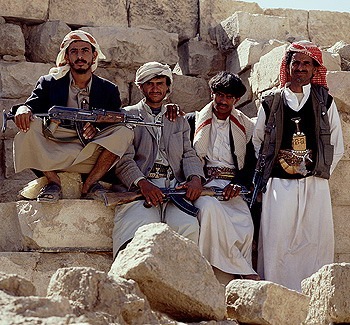Yemen Feature: The Houthi Movement and the Revolution (Wells)
 Madeleine Wells writes for Foreign Policy:
Madeleine Wells writes for Foreign Policy:
Walking last month into the Shabaab al-Sumud tent in Yemen's Maydan Taghayr --- Change Square --- I was greeted by eager faces and talkative qat chewers. "We love Americans," a Houthi supporter nodded his head vigorously, and, in doing so, revealed an enormous poster on the tent flap behind him on which the group's infamous slogan was inscribed: "God is Great, Death to America, Death to Israel, a curse on the Jews." Seeing my eyes widen, he offered, "We hate American policies, notpeople. The roots of the slogan lie in America's war on the Iraqi people and support for Israeli policies against the Palestinians. Let me tell you what it is that the Houthis want...."
Even the dedicated observer of Yemeni affairs can be forgiven for not fully grasping the complexity of the country's political milieu during this shaky revolutionary period. Researching Yemeni politics, one often feels stuck in an intractable game of telephone. Part of this is the grammar of how information spreads in the Middle East, which is often informal and decentralized. But part of it can be related to the political ecology of the country and the palpable gap between the geographical center and periphery. The history of the political evolution of the Shiite "Houthi" rebels of Saada province is no different. Unraveling what the Houthis want may indicate how other independent and marginalized groups, like the southern separatists, will navigate a post-Saleh Yemen. The political integration of the Houthis is one among the myriad problems faced by newly minted President Abed Rabbo Mansour al-Hadi, who underwent his official installation ceremony today in Sanaa. An assessment of Houthi interests also suggests a larger difference than we realize between the opposition movements in cities like Sanaa, Taiz, and Aden, and the supporters they claim to represent in rural areas.
Even before the mass protest movement calling for Ali Abdullah Saleh's immediate ouster began heating up last spring -- long before dozens of provincial officers quit their post or before there were battles between security forces and protesters from the Saudi Arabian border to Aden -- Yemen's central government exercised very limited control over vast swaths of Yemeni territory. In many provinces, the Yemeni army has occupied little more than walled military garrisons, and officers often had to ask permission from local sheikhs before embarking on missions. However, Saleh's regime has regularly attempted to brutally impose authority over many of these regions.
 Foreign Policy magazine,
Foreign Policy magazine,  Houthis,
Houthis,  Madeleine Wells,
Madeleine Wells,  Yemen
Yemen 
Reader Comments